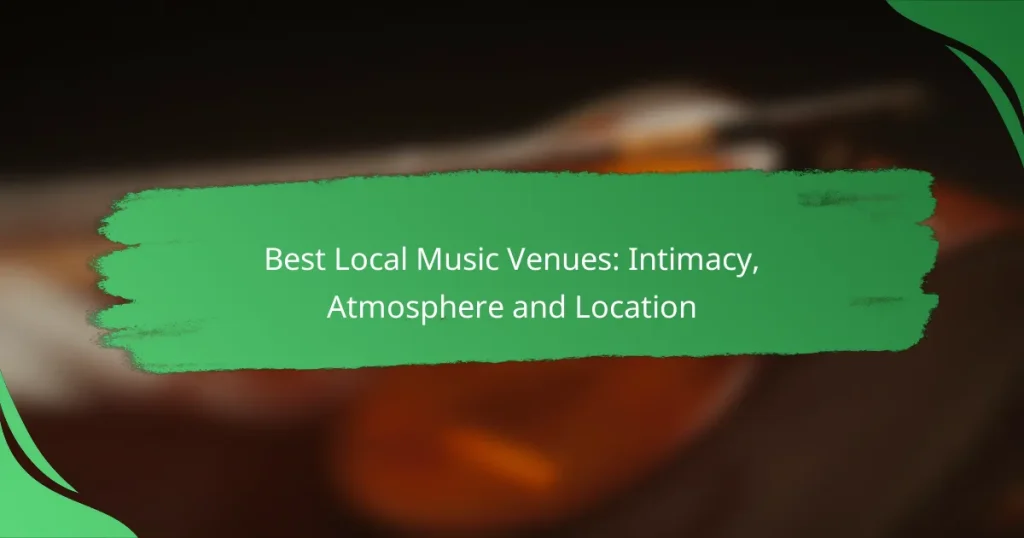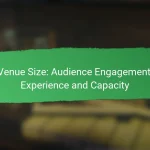Discovering the best local music venues in New York City reveals a treasure trove of intimate spaces that foster vibrant atmospheres and unforgettable experiences. These venues not only showcase a diverse array of musical genres but also create close-knit environments where audiences can truly connect with the performers. When choosing a venue, factors like location, sound quality, and ambiance play a crucial role in enhancing the overall experience for everyone involved.
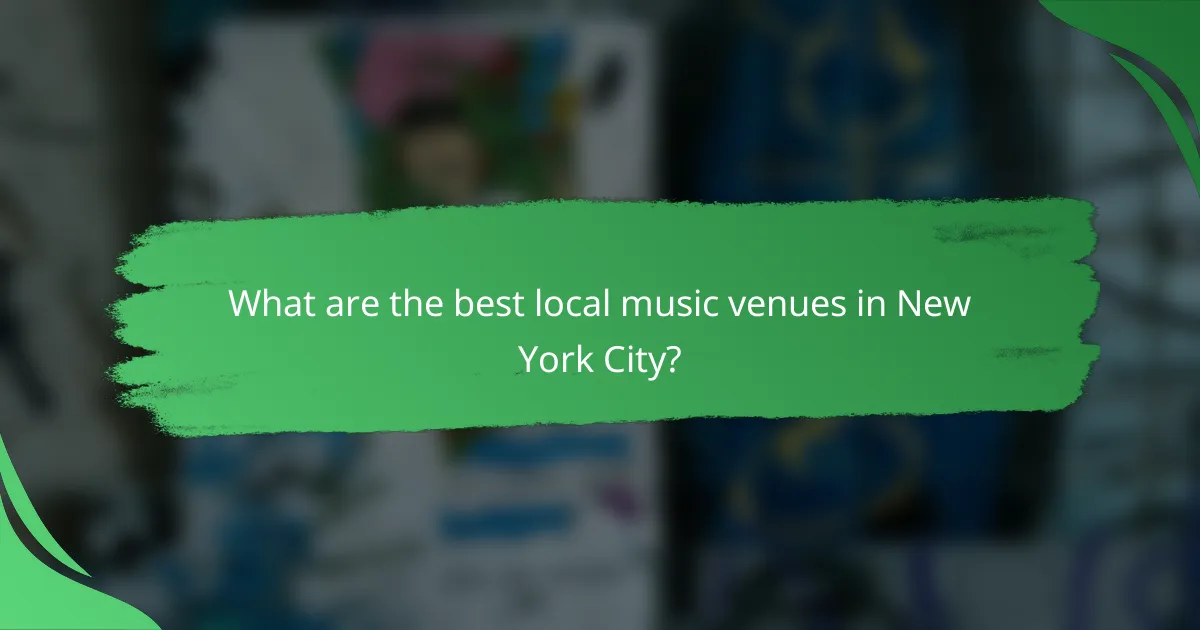
What are the best local music venues in New York City?
The best local music venues in New York City offer a mix of intimacy, vibrant atmosphere, and prime locations. These venues are known for showcasing a variety of genres, providing memorable experiences for both artists and audiences.
The Bowery Ballroom
The Bowery Ballroom is renowned for its exceptional acoustics and intimate setting, making it a favorite among both performers and fans. With a capacity of around 600, it allows for close interaction between artists and the audience.
Located in Manhattan’s Lower East Side, this venue hosts a diverse lineup of acts, from indie rock to electronic music. Its historic charm and modern amenities create a unique atmosphere that enhances the live music experience.
Brooklyn Steel
Brooklyn Steel is a larger venue, accommodating up to 1,800 guests, and is known for its industrial aesthetic and excellent sound quality. It frequently features popular and emerging artists across various genres.
Situated in East Williamsburg, this venue offers a spacious layout with a standing-room-only floor, allowing for an energetic concert atmosphere. The venue’s bar and food options add to the overall experience, making it a great choice for a night out.
The Apollo Theater
The Apollo Theater is an iconic venue located in Harlem, famous for its rich history and cultural significance in the music world. With a capacity of about 1,500, it has hosted legendary performances since the 1930s.
This venue is particularly known for its Amateur Night, where aspiring artists can showcase their talent. The Apollo’s unique atmosphere and historical legacy make it a must-visit for music lovers in New York City.
Webster Hall
Webster Hall is a historic venue that has been a staple of New York’s music scene since the 1880s. With a capacity of around 1,500, it features multiple rooms and hosts a wide range of events, from concerts to dance parties.
Located in the East Village, Webster Hall is known for its vibrant nightlife and diverse programming. The venue’s rich history and eclectic atmosphere attract both local and international acts, making it a popular destination for music enthusiasts.
Mercury Lounge
Mercury Lounge is a small, intimate venue in the Lower East Side, with a capacity of about 250. This venue is ideal for discovering up-and-coming artists and enjoying a more personal concert experience.
With its laid-back vibe and affordable ticket prices, Mercury Lounge is a favorite among locals. The venue often features a mix of genres, from rock to folk, making it a great spot for music lovers looking for something new and exciting.
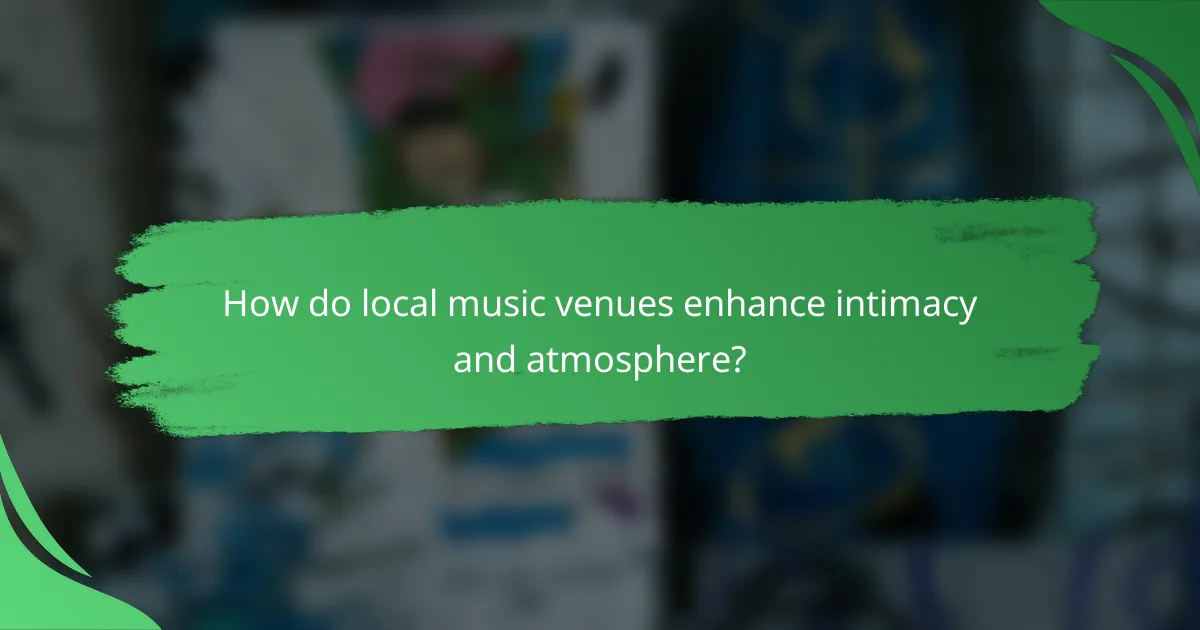
How do local music venues enhance intimacy and atmosphere?
Local music venues enhance intimacy and atmosphere by creating close-knit environments where audiences can connect with performers and each other. These spaces often prioritize unique design elements and sound quality, fostering memorable experiences that larger venues may lack.
Intimate settings
Intimate settings are characterized by smaller capacities, often accommodating just a few dozen to a few hundred attendees. This closeness allows for a more personal connection between the artist and the audience, making performances feel more engaging and interactive.
Many local venues feature cozy seating arrangements, dim lighting, and unique decor that contribute to a warm atmosphere. This setting encourages audience members to feel more comfortable and involved, enhancing the overall experience.
Unique acoustics
Unique acoustics in local music venues often arise from their architectural design and materials used in construction. Smaller venues can create a more controlled sound environment, allowing for clearer audio and a more immersive listening experience.
For instance, venues with wooden floors and walls may produce warmer tones, while those with high ceilings can enhance vocal clarity. This focus on acoustics helps artists deliver their music in a way that resonates deeply with the audience.
Personalized experiences
Personalized experiences at local music venues often include opportunities for audience interaction, such as Q&A sessions or meet-and-greets with performers. These interactions can create lasting memories and foster a sense of community among attendees.
Additionally, many venues curate their lineups based on local talent, allowing audiences to discover new artists and genres. This focus on local culture not only supports musicians but also enriches the community’s music scene.
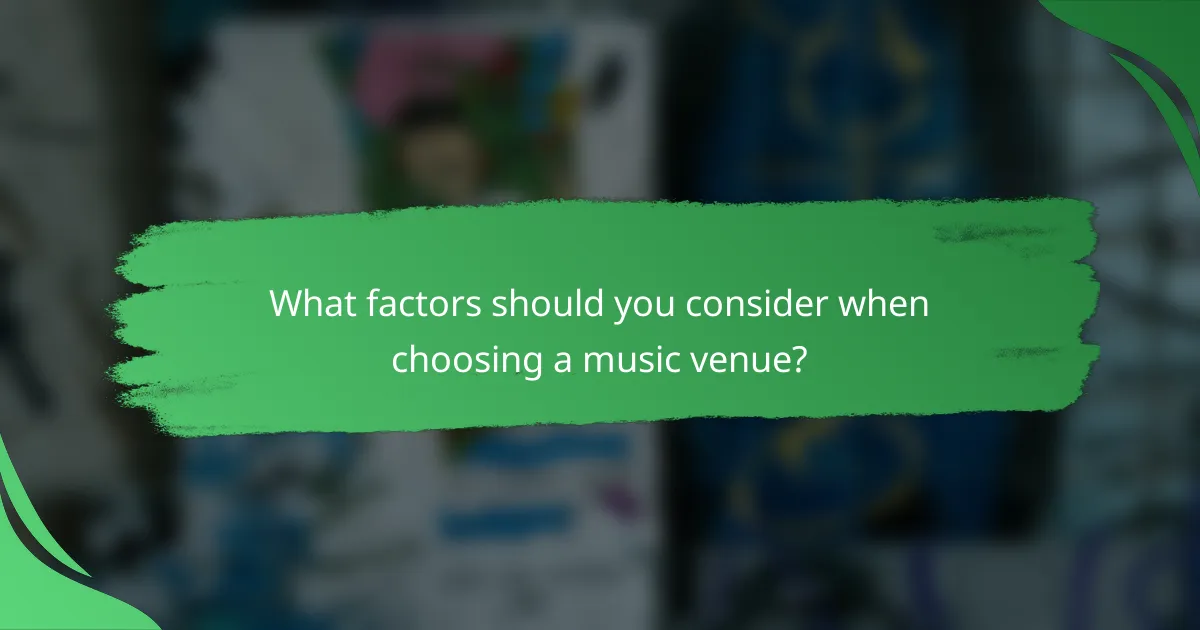
What factors should you consider when choosing a music venue?
When selecting a music venue, consider location accessibility, capacity and layout, sound quality, and ambiance. Each of these factors significantly influences the overall experience for both performers and attendees.
Location accessibility
Location accessibility is crucial for ensuring that your audience can easily reach the venue. Look for venues that are near public transportation, have ample parking, or are situated in walkable areas. Venues in city centers often attract larger crowds due to their convenience.
Consider the surrounding neighborhood as well; areas with restaurants and bars can enhance the overall experience, allowing attendees to enjoy a full night out. Check local regulations regarding noise and closing times, as these can affect the venue’s appeal.
Capacity and layout
The capacity and layout of a venue can greatly impact the atmosphere of a performance. Smaller venues create an intimate setting, allowing for closer interaction between artists and the audience. However, larger venues can accommodate more fans, which may be necessary for popular acts.
Evaluate the layout for sightlines and acoustics. A well-designed space ensures that everyone has a good view and can hear the performance clearly. Consider whether the venue has standing room, seating, or a mix, as this can affect the comfort and engagement of the audience.
Sound quality
Sound quality is a key factor when choosing a music venue. Look for venues that are known for their excellent acoustics and sound systems. A good venue should have sound engineers on staff to ensure optimal audio during performances.
Check reviews or ask for recommendations to find venues that consistently deliver high-quality sound. Poor acoustics can detract from the performance, so prioritize venues that invest in their sound equipment and setup.
Ambiance and decor
The ambiance and decor of a venue contribute significantly to the overall experience. A well-decorated space can enhance the mood and make the event more memorable. Look for venues that reflect the style of the music being performed, whether it’s a cozy bar or a sleek concert hall.
Consider the lighting, seating arrangements, and overall aesthetic. Venues that create a unique atmosphere often attract repeat visitors. Pay attention to how the decor complements the music genre, as this can enhance audience engagement and enjoyment.

What are the top music venues in Los Angeles?
Los Angeles boasts a vibrant music scene with several renowned venues that offer unique experiences. The top music venues are known for their intimate atmospheres, diverse lineups, and prime locations, making them popular spots for both locals and tourists.
The Troubadour
The Troubadour is an iconic venue located in West Hollywood, famous for its intimate setting and rich history. It has hosted legendary artists like Elton John and Bob Dylan, making it a must-visit for music lovers.
With a capacity of around 400, the venue allows for close interactions between performers and the audience. Tickets often sell out quickly, so purchasing in advance is advisable.
The Greek Theatre
The Greek Theatre, nestled in Griffith Park, is known for its stunning outdoor setting and excellent acoustics. This venue can accommodate approximately 5,900 guests, offering a larger yet still intimate concert experience.
Attendees can enjoy a variety of genres, from rock to classical, while surrounded by beautiful natural scenery. Arriving early can enhance the experience, allowing time to explore the park and enjoy pre-show dining options nearby.
The Roxy Theatre
The Roxy Theatre, located on the Sunset Strip, is a historic venue with a capacity of about 1,000. It has been a launching pad for numerous famous acts, including Bruce Springsteen and The Doors.
This venue offers a lively atmosphere with a bar and lounge area, making it a great spot for socializing before the show. Be sure to check their schedule for upcoming performances, as they often feature both established and emerging artists.
Hollywood Bowl
The Hollywood Bowl is a world-famous amphitheater that hosts a wide range of performances, from orchestras to popular music concerts. With a capacity of around 18,000, it is one of the largest outdoor venues in the country.
Its unique bowl shape enhances sound quality, creating an unforgettable experience. Guests are encouraged to bring picnic supplies to enjoy during performances, adding to the venue’s relaxed and festive atmosphere.
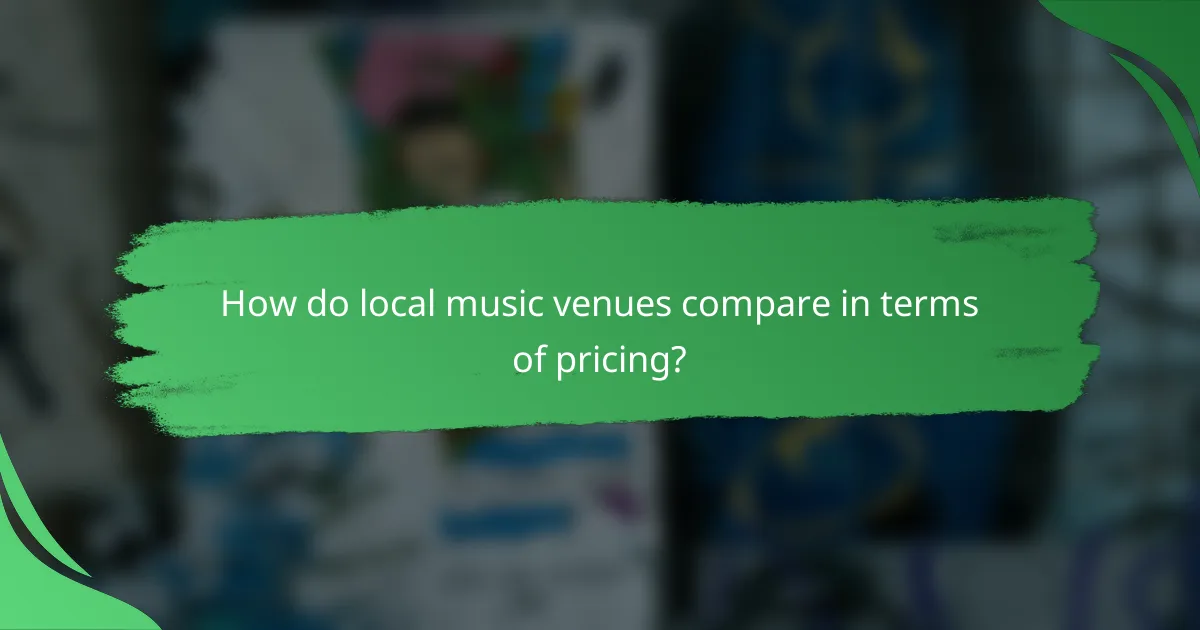
How do local music venues compare in terms of pricing?
Local music venues vary significantly in pricing, influenced by factors such as location, artist popularity, and the overall experience offered. Understanding ticket prices, food and beverage costs, and membership programs can help you budget for a night out.
Ticket prices
Ticket prices at local music venues typically range from around $10 to $50, depending on the artist and venue size. Smaller, intimate venues may charge less, while larger or more popular acts can command higher prices. Always check for advance purchase discounts or special promotions to save money.
Some venues offer tiered pricing based on seating or standing areas, so consider your preferences when selecting tickets. Keep an eye out for local events that may feature emerging artists at lower costs, providing a great opportunity to discover new music.
Food and beverage costs
Food and beverage prices at music venues can vary widely, with drinks typically costing between $5 and $15 and food items ranging from $8 to $20. Venues with a full-service restaurant may have higher prices, while those offering snack bars or food trucks might provide more affordable options.
To save money, consider dining before the show or taking advantage of happy hour specials if available. Some venues allow you to bring your own snacks, but always check their policies beforehand.
Membership or loyalty programs
Many local music venues offer membership or loyalty programs that provide discounts on tickets, food, and beverages. These programs often require a small annual fee but can save you money in the long run, especially if you attend shows frequently.
Look for venues that offer exclusive member events or early ticket access, which can enhance your experience. Always read the terms and conditions to understand the benefits and any potential restrictions associated with the program.
